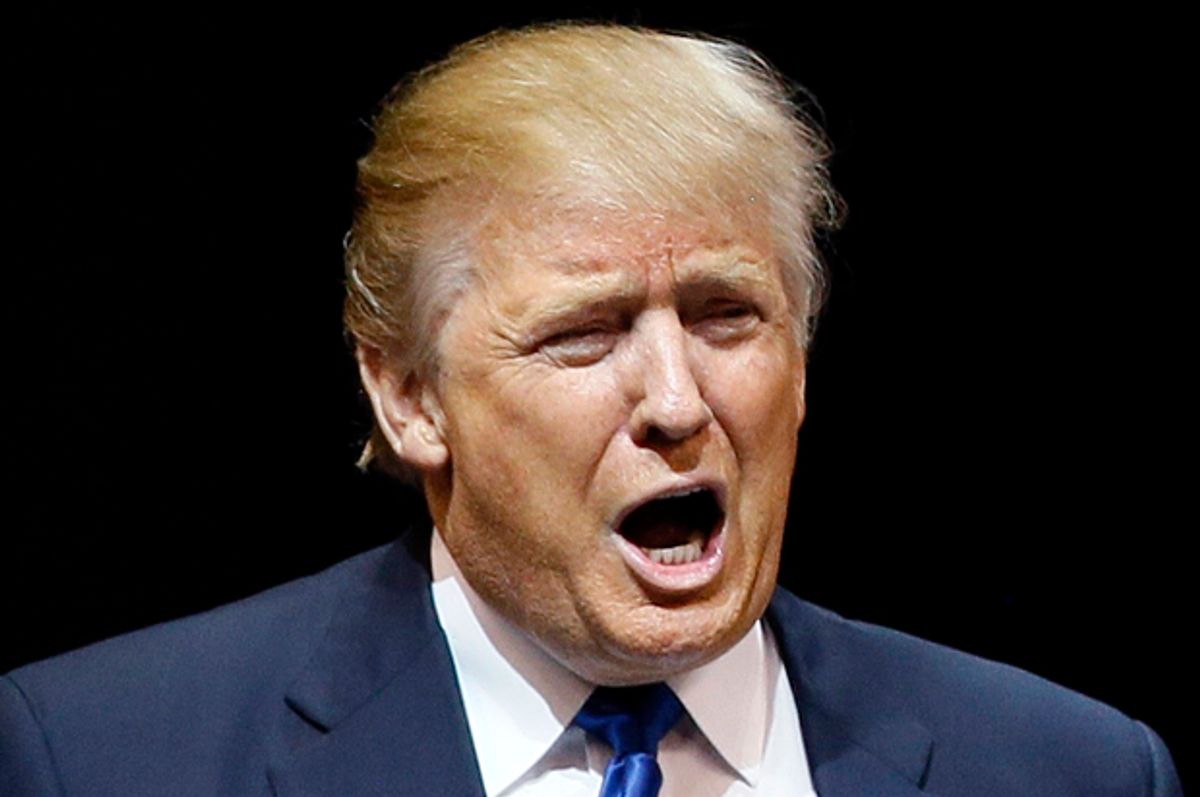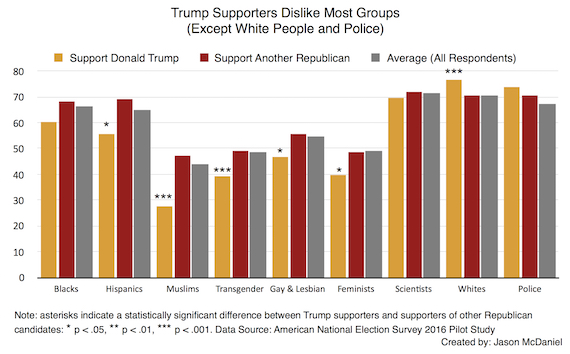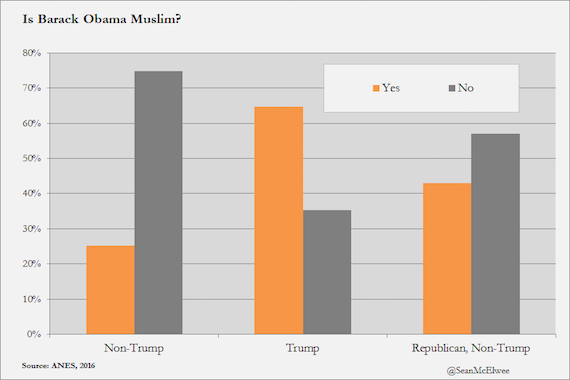It’s essentially settled that Donald Trump will be the Republican nominee for 2016, and pundits are now fumbling to explain his unprecedented path to the nomination. In doing so, many focus on the uniqueness of Trump’s appeal to certain voters. We ourselves have contributed several pieces to the genre, demonstrating the strong connection between racially resentful attitudes and support for Trump among white people. Of course, any human phenomenon will be complex and nuanced, so a certain amount of humility is required. Nonetheless, in our newest analysis, we examine the feelings expressed by Trump supporters towards a variety of groups in America, and the results are pretty clear: Trump supporters really dislike many identity groups in America. For these voters, Trump’s blend of casual racism and muscular nativism is the core of his appeal.
Mad as hell
To explore the attitudes of Trump supporters, we examined the American National Election Studies 2016 pilot study. The dataset includes a series of feeling thermometer questions, which ask respondents to place various groups and political figures on a scale from 100 (very warm or favorable feeling) to 0 (very cold or unfavorable feeling). By taking the mean response of Trump supporters, the supporters of other GOP candidates and the general population, we can gauge the warmth of their feelings towards different groups.
We find that, in short, Trump supporters are quite salty. Even after controlling for race, party identification, ideology, family income, education and age, Trump supporters are more likely to have cold feelings toward many of the included groups. As the chart above shows, Trump supporters are more likely than supporters of other Republican candidates to have negative feelings towards feminists, Muslims, Latinos, Gays and Lesbians, and Transgender people. These findings also hold when compared to supporters of Hillary Clinton. In contrast, Trump supporters have far warmer feelings towards whites than supporters of other candidates.
White ethnocentrism more important for Trump supporters
One possible explanation for the results presented above is that attitudes about race and racial identity are stronger motivations for Trump supporters compared to supporters of other candidates. Here, we explore how white racial identity, or ethnocentrism, interacts with negative feelings about people of color. The results presented in the graph below demonstrate that as racial identity becomes increasingly important for a white Trump supporter, they express significantly more negative feelings towards both Muslims and Latinos. However, racial identity does not play the same role for supporters of other Republican candidates. Although feelings towards both groups become more negative as white racial identity becomes more important, the effect is not statistically significant. This is strong evidence that white racial identity plays a more important role in how Trump supporters evaluate people of color compared to those who support other candidates.
White racial resentment and American greatness
During his campaign, Donald Trump expresses a strikingly negative view about the direction of the country, and frequently invokes threats both internal and external to explain the deterioration of America’s “former” greatness. Furthermore, unlike many past Republican nominees, Trump does not bother to hide behind racially coded language when connecting that perceived deterioration to the country’s changing racial diversity. Analysts have drawn connections between Trump’s message and perceptions of threatened status among many segments of the white Republican electorate. We find that 61 percent of Trump supporters say that being an American is “extremely” important to their identity, compared to 37 percent of non-Trump supporters. Among Republicans who don’t support Trump, half say being American is “extremely” important to their identity.
In the graph below, we show that white Trump supporters feelings about their own racial group are strongly related to attitudes of racial resentment and to how they perceive their identity as Americans. For white Trump supporters, positive feelings about white people increase dramatically as the importance of American identity increases. Perhaps surprisingly, for supporters of other Republicans there is no relationship between the importance of being American and feelings towards white people.

The Trump phenomenon may be the last gasp of the old world order, in which white men ruled and anyone who didn’t conform would be ostracized. Trump supporters appear to resemble the supporters of Wallace and Nixon, with their support for the police and whites, and their disdain for those who don’t conform to the “Silent Majority.” The work above suggests that Trump supporters might be motivated less by positive feelings about Trump and more by negative feelings about groups they dislike that are motivated by the perception of threats to their identity as white people in America. If Trump stands for anything, it is the restoration of his supporters threatened racial identity by standing against gays, lebsbians and other groups his supporters dislike.
There are other reasons to believe nativism drives Trump support. An interesting ANES question explores the racial dynamic. It asks respondents, “How likely do you think it is that a Latino president would focus too much on trying to help immigrants?” We find 44 percent of white Trump supporters thought it was “extremely” or “very likely” that a Latino President would focus too much on immigrants, compared with 25 percent of whites who didn’t support Trump. Trump supporters are also dramatically more likely to believe that Obama is a Muslim. A full 64 percent of Trump supporters say that Obama is a Muslim, compared to 25 percent of non-Trump supporters. Among Republicans who reject Trump, 42 percent believe Obama is a Muslim.
As political scientist Michael Tesler previously showed, Republicans and Independents who are worried that people of color will take white jobs and who believe that whites should work together to change laws unfair to whites are more likely to support Trump.
"Economic anxiety" doesn't fully explain support for Trump
One of the common reasons given to explain the rise of Trump is the idea that his supporters are motivated by economic anxiety. In a recent New York Times piece, Nicholas Confessore writes of the divide in the GOP between elites and the base, arguing,
Many trace the rupture to the country’s economic crisis eight years ago:While Americans grew more skeptical of the banking industry in the aftermath, some Republicans played down the frustrations of their own voters.
He writes of the “disaffecteds,” who are “older white voters with little education beyond high school, under enormous economic stress.” (We’ve argued these “Disaffecteds” were driven by racial animus.) However, there is an ongoing debate as to whether Trump supporters have a higher or lower income than other Republicans.
This debate, while interesting, doesn’t get to the core of Trump support. (Family income isn’t a predictor of Trump support in any of our models.) More importantly this narrative is difficult to square with the reality that although Blacks and Hispanics have significantly worse economic outcomes than whites, few have rushed to support Trump. In addition, we find that variables connected to economic anxiety do not predict Trump support after other factors are controlled for. (A recent Washington Post analysis finds that racial concerns are stronger predictors of Trump support than economic ones.) Rather, we find that what drives support for Trump is the mistaken belief that the government serves the interests of Blacks, rather than whites. Political scientist Brian McKenzie finds that,
“whites who feel the Obama administration is looking out for the economic interests of blacks are more likely to express frustration with their own financial position.”
Conclusion: Trump And The Politics Of Anger
Our findings point to an important lesson in political science: the increasing power of negative polarization, or the politics of anger. Anger is a driving feature in American politics. Americans are increasingly likely to report that their vote choice is driven by opposing their opponent, rather than the favoring the candidate they like. They are more likely to believe the other party poses a “threat to the nation’s wellbeing.”
As Pew puts it,
Holding deeply negative views of the opposite party and its leaders is correlated with political participation, and this is particularly true among Republicans in the current context. Republicans who hold a very unfavorable opinion of the Democratic Party are 18 points more likely than those whose opinion is mostly unfavorable to say they always vote.
Political scientists Alan Abramowitz and Steven Webster write, “partisan identities have become increasingly associated with racial, cultural and ideological divisions in American society.”
Research suggests that right-wing views are strongly correlated with negative feelings towards groups considered as “others.” Trump clearly draws on these attitudes: His supporters have negative feelings towards most of the groups we examined, with the exception of the police and whites. We also find that white identity leads Trump supporters to have more negative feelings about Latinos and Muslims, and this effect isn’t true among whites who support other Republican candidates. The fact that Trump supporters hold racist views obviously doesn’t mean they deserve to suffer economically. Far from it. Rather, it suggests that a powerful plutocratic class has exploited racial animus to divide the working class and push forward its agenda. Progressives must be aware that this, not nebulous feelings of “economic anxiety,” is animating Trump support.
As Marc Hetherington and Drew Engelhardt have shown, the major parties have increasingly polarized across racial lines (with more racially conservative whites joining the Republicans, and racially sympathetic whites joining in the Democrats). This is due to an intentional strategy on the right to manipulate racial animus for political gains. Nearly half a century ago, Lee Atwater immortalized the what was known as the “Southern Strategy,”
You start out in 1954 by saying, 'N***er, n***er, n***er,'" said Atwater. "By 1968, you can't say 'n***er' — that hurts you. Backfires. So you say stuff like forced busing, states' rights, and all that stuff. You're getting so abstract now [that] you're talking about cutting taxes, and all these things you're talking about are totally economic things, and a byproduct of them is [that] blacks get hurt worse than whites."
In 2005, Republican National Committee Chairman Ken Mehlman apologized for the Southern Strategy. In 2016, their nominee’s campaign is currently being run by the man who oversaw the Southern Strategy for Reagan in 1980.




Shares